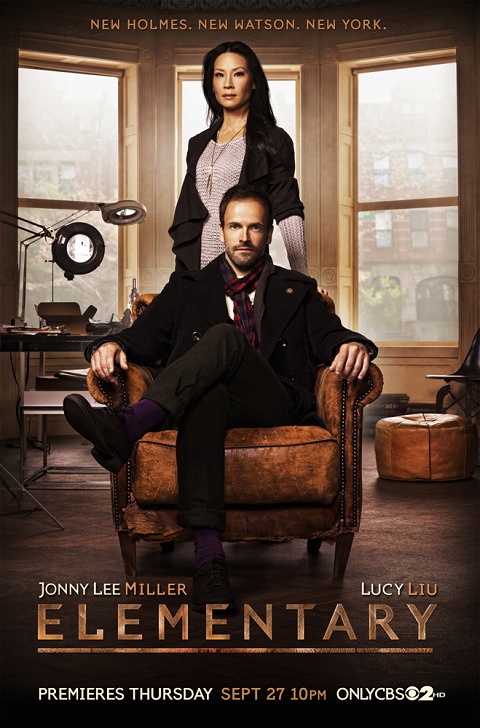So was it worth all the kerfuffle?
In some respects no. In last night's pilot of Elementary, Lucy Liu proved herself very adept at being the every man foil to an unhinged detective. As the element people were most worried about, she was a pleasant surprise. From a design point of view, she also had a very good "look." I also don't mind the New York setting. It can work.
 I suppose my main criticism of the show thus far (and I realize most network shows need to settle in over the first few episodes) is that it's sort of bland. Johnny Lee Miller's Holmes is an arrogant detective and recovering drug addict. Yes, he may have the capacity to be an interesting character, but he's not yet. Nothing is really screaming "Holmes" about him either. He keeps bees, that was the one token quirk they threw the audience last night. The possibility of Holmes' father is new to the pastiche genre and may have some possibility, but I'm still not convinced by the writing or Miller's portrayal of the character. He doesn't have the mystique or the charisma yet.
I suppose my main criticism of the show thus far (and I realize most network shows need to settle in over the first few episodes) is that it's sort of bland. Johnny Lee Miller's Holmes is an arrogant detective and recovering drug addict. Yes, he may have the capacity to be an interesting character, but he's not yet. Nothing is really screaming "Holmes" about him either. He keeps bees, that was the one token quirk they threw the audience last night. The possibility of Holmes' father is new to the pastiche genre and may have some possibility, but I'm still not convinced by the writing or Miller's portrayal of the character. He doesn't have the mystique or the charisma yet.The NYPD is also really boring. So far we've seen Captain Gregson who worked with Holmes while he was abroad attached to Scotland Yard. Their history and relationship doesn't really read at this point. Detective Abreu seems like someone Holmes might rub the wrong way. In their first scene, Holmes disproves the Detective's assumptions about a crime scene. Yet, later in the episode he does Holmes' bidding with little trouble. Right now the police are just placeholders, filling a function, not real people with internal lives and the possibility for conflict.
I wish they hadn't advertised this as a Sherlock Holmes adaptation. If they had changed everyone's names, I would have no trouble enjoying it as a new "consulting detective" show on CBS. We could have had a show that pays homage to Holmes in its inspiration instead of a "Sherlock Holmes" show that never quite delivers.
There is a good possibility that the show will find its footing and be quite decent. But nothing so far says it's Sherlock Holmes to me. Sherlock Holmes wouldn't have kinky ladder sex with a prostitute. I also don't believe that he would ever have a "temper tantrum" to the extreme he does in this pilot. His mind is always in control. He may do bizarre things, but it's for a purpose, a master plan. So far, I'm not certain Miller's Holmes is capable of the "long-game," if you will. How will he cope when a Moriarty is eventually introduced?
Some fans are rejoicing the fact that Miller is an attractive and competent actor that they can enjoy in the role for twenty or so episodes per season. Yes it's hard to wait a year and half for each set of three episodes from Sherlock, but they are more than episodes, aren't they? They're really mini-films. "A Study in Pink" held up side by side with this first episode creates a sad comparison. Really, there is no comparison. Elementary is.... HolmesLite. We'll be getting a decent, Sherlock Holmes-ish series in great quantity, but nowhere near the quality and detail of Sherlock.
So will I watch it? Probably. At least unless they do something that's unforgivable to me. It's just an entirely different beast from Sherlock.
